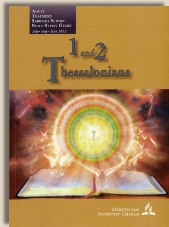|
||||||||||||||
Commentary on "The Gospel Comes to Thessalonica"
Day 5: Wednesday, July 4, 2012 - Suffering Before Glory
Overview
On the day of his resurrection Jesus approaches two men on their way to Emmaus, a village outside of Jerusalem. With reference to his crucifixion Jesus has this to say:
And he said to them, “O foolish ones, and slow of heart to believe all that the prophets have spoken! Was it not necessary that the Christ should suffer these things and enter into his glory?” And beginning with Moses and all the Prophets, he interpreted to them in all the Scriptures the things concerning himself. (Luke 24:25-27 ESV)
The lesson author assumes both Jesus and Paul studied the Old Testament scriptures to find a bases for coming to the conclusion that Jesus must first become a suffering Messiah.
Observations
Since God’s plan for the redemption of mankind was fully in place before 'time began’ there is no reason for Jesus to have a need to study scripture to learn that he would first have to become a suffering Messiah before he could rein in glory. Since Jesus and the Father are one, everything the Father knew on this topic Jesus also knew and he certainly knew this before he was born of the Virgin Mary. Note well that everything mentioned in the following passage was foreknown and in place before 'the foundation of the world’:
Blessed be the God and Father of our Lord Jesus Christ, who has blessed us in Christ with every spiritual blessing in the heavenly places, even as he chose us in him before the foundation of the world, that we should be holy and blameless before him. In love he predestined us for adoption as sons through Jesus Christ, according to the purpose of his will, to the praise of his glorious grace, with which he has blessed us in the Beloved. In him we have redemption through his blood, the forgiveness of our trespasses, according to the riches of his grace, which he lavished upon us, in all wisdom and insight making known to us the mystery of his will, according to his purpose, which he set forth in Christ as a plan for the fullness of time, to unite all things in him, things in heaven and things on earth. (Eph. 1:3-10 ESV)
God knew exactly what he had in mind when he said this to the Serpent:
I will put enmity between you and the woman, and between your offspring and her offspring; he shall bruise your head, and you shall bruise his heel.” (Gen. 3:15 ESV)
While it is uncertain what Adam or Eve or any other sinner in the history of fallen mankind may have understood by this statement of God, it is absolutely certain Jesus Christ knew and understood because as the Son of God he is one with God the Father.
When conceived of the Holy Spirit and born here on earth of the Virgin Mary, it is very doubtful that he needed to study scriptures in the way the Apostle Paul did in order to understand what his role here on earth was to be or what he must suffer to fulfill that role or even that he needed to learn what he knew as our Creator. Jesus knew of the redemption plan before mankind had a need for redemption.
Luke 2:39-52 is the only place in the gospels where we have a record of Jesus’ youth. At age twelve we see where he sat and talked with the teachers in the temple. From this we learn that 'all who heard him were amazed at his understanding and his answers’. This passage also mentions that 'Jesus increased in wisdom and in stature and in favor with God and man’. When his parents located him in the temple and ask why he was there he replied with “Did you not know that I must be in my Father’s house?” There is nothing in this passage to indicate how he grew in this wisdom or that he studied scripture as Paul would have to learn from them concerning his ordained role as mankind’s suffering Messiah. We only know that at age twelve he was fully aware that he was the Son of God and that the temple was his Father’s house.
The series of examples used in the Quarterly lesson such as reference to Moses who was eighty years old and had spent forty years shepherding sheep before God considered him ready to lead Israel out of slavery is without merit because the need for a fallen sinner to mature and grow in sanctification according to God’s own timetable has virtually nothing in common with why a holy perfect and all-knowing Messiah would need to study the scripture to determine that he himself must suffer and pay sinful mankind’s penalty before he would rein in glory.
God does not always explain the reason for his actions in a way we think he should answer. Since Jesus was holy, perfect and without sin, there was no need for Jesus to grow in sanctification before he could serve the purposes of the Father. When Jesus, in his youth, grew in wisdom it was not the same as a human born with a sin nature growing into maturity and then hopefully seeing his need for a Savior who would redeem him from the penalty of his sins.
Instead of getting bogged down in endless speculation here is a simple biblical explanation of why God did what he did:
“For God so loved the world, that he gave his only Son, that whoever believes in him should not perish but have eternal life. For God did not send his Son into the world to condemn the world, but in order that the world might be saved through him. Whoever believes in him is not condemned, but whoever does not believe is condemned already, because he has not believed in the name of the only Son of God. (John 3:16-18 ESV)
Because of his love God provided the only way for the penalty for sin to be paid which was the death of a perfect holy Savior who just happened to be his only Son, Jesus Christ.
Summary
- The Quarterly lesson assumes that both Paul and Jesus studied scriptures to understand the gospel message and why God does what he does. This is rather silly since Jesus knew full well what the plan for fallen mankind’s sin was before sin even existed in the world and that he would perform the central role in that salvation.
- Since Jesus is the Son of God he is and always was perfect and holy with no need to grow in sanctification. Only sinners need sanctification. Therefore, when Jesus grew in wisdom it was without precedence within the fallen human race. Giving examples of men who grew in sanctification before God was ready to use them in a glorious role explains nothing about why Jesus suffered on the cross, died, descended into the grave and then three days later was raised from the dead to be seating in glory at the right hand of the Father nearly two thousand years ago.
- Therefore, the only valid explanation of why Jesus was willing to suffer death as a payment for our sin is the Father’s love for the fallen human race.
Copyright 2012 BibleStudiesForAdventists.com. All rights reserved. Revised June 26, 2012. This website is published by Life Assurance Ministries, Camp Verde, Arizona, USA, the publisher of Proclamation! Magazine. Contact email: BibleStudiesForAdventists@gmail.com.
The Sabbath School Bible Study Guide and the corresponding E.G. White Notes are published by Pacific Press Publishing Association, which is owned and operated by the Seventh-day Adventist church. The current quarter's editions are pictured above.
Official Adventist Resources
Standard Edition Study Guide Week 1
Teacher's Edition Study Guide Week 1
Easy Reading Edition Study Guide Wk 1
Search the Complete Published Ellen G. White Writings
Please Support This Project


